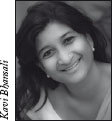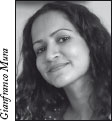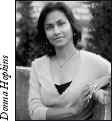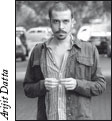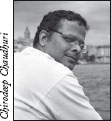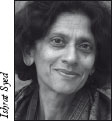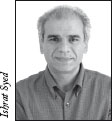Mumbai Noir (30 page)
Authors: Altaf Tyrewala
Tags: #ebook, #Fiction, #Mystery & Detective, #Bombay (India), #India, #Short Stories; Indic (English), #book, #Mystery Fiction - India, #Short Stories
The blue blob on the teeth of the key.
“Then he would get duplicates cut,” Jende continued.
“The keywalla outside.”
“Haan. He was part of it.”
“Picked him up?”
“Like in the films
Faraar
and
Nau do gyarah
. When the first cops came only.”
“Involved?”
“Something they must have given him. He must have known. How many keys people can lose?”
Peter thought about that. “Then the two of them would rob the house?”
“No, only Vishal. Only this time, that woman Madhavi came back. She found him there and began screaming. He hit her to shut her up. Hit her too hard. Broke her neck. Then he went back home and told Kalsekar. Kalsekar told him to run away, to go to his gaon. Vishal didn’t. He went to the station and then came back to the gym.”
“Why?” Peter asked.
“The maal. The loot. He wanted his share of what they had taken from Madhavi’s house. He told Kalsekar that.”
Peter was still a little confused. “That upset the old man so much that he picked up a dumbbell and beat the boy to death?”
“No, worse. Vishal said he was going to the police. He said he was going to tell them that Kalsekar had done it all. He told Kalsekar he had left Kalsekar’s fingerprint back at Madhavi’s house.”
“That’s not possible … is it?”
Jende grinned, a rare occurrence. “See, even you don’t know. You’re not sure if your fingerprints can turn up in someone else’s house. Kalsekar believed Vishal. That was the problem. That was what killed Vishal. That Kalsekar believed him.”
“A little knowledge is a dangerous thing.”
“Waah waah.”
“Not me, Pope.”
“You Catholics bring your pope into everything. Do you know where we found him?”
“The pope?”
“Why we’ll be looking for your pope? Where we found Kalsekar.”
“Where?” Peter braced himself. Surely not another dead body? Things come in threes …
“In the market. Apna Gopi Tank Market. He was trying to get one of the kassais to cut off his fingertips.”
Peter looked carefully at his friend. He couldn’t be sure whether this was a joke or not, but Jende had his police face on. “You’re giving me some daaru-shaaru or no?” Peter took out his bottle of Royal Challenge.
“Chhee. RC still?” Jende protested.
“I am one.”
“You are a Royal Challenge?”
“Jay, your brains have gone on bandobast or what? I’m a Roman Catholic, RC. Royal Challenge, RC? Got it?”
“Anything you’ll say to save money. Cheapda,” said Jende, but he seemed to relish the first fiery swig.
“Besides,” said Peter, “you might arrest me if I serve you Black Label.”
The following glossary provides simple explanations of select (though by no means all) Indian terms used in
Mumbai Noir.
These words come from Hindi, Urdu, Maharathi, Punjabi, and Gujarati.
Abba/Abbu
: father
Abbe
: friendly, informal word to refer to a man
Accha
: okay; good
Adaab
: a Muslim greeting
Adda
: a group hangout
Adhan
: Islamic call to prayer
Adrak
: ginger
Ammi
: mother
Arrey
: hey
Baba
: father; older man; holy man
Baccha
: child
Bakr’a Eid
: the second Eid holiday when goats are sacrificed
Banda
: colloquial term for a man
Bandobast
: arrangement
Baniya
: trader; shopkeeper
Bhabhi
: sister-in-law (brother’s wife)
Bhai
: brother; gangster (colloquial)
Bhen
: sister
Bhenchod
: sisterfucker
Bhuna-gosht
: roasted meat
Biryani
: a rice dish which usually contains meat and saffron
Boondi
: small fried chickpea flour balls
Bun maska
: a Parsi snack consisting of a roll and butter
Chal hutt
: get out of the way
Challan
: ticket from the police
Champi
: head massage
Chana daal
: split chickpea lentils
Chawl
: tenement house
Chela
: disciple
Chikna
/
Chikni
: smooth; greasy
Chowki
: police station
Churidar
: tight pajama bottom
Chutiya
: a pussy chaser; a moron; a loser
Crore
: ten million
Daal
: curried lentils
Daaru
: alcoholic drinks
Dabba
: box
Dawakhana
: pharmacy
Dhobi
: washerman
Dhoti
: traditional sarong for men
Djibba
: Muslim attire worn by men
Dupatta
: a long scarf women wear with a salwaar kameez
Durgah
: a Muslim saint’s shrine or tomb
Faltu
: extra; useless
Firang
: foreigner (slang, slightly derogatory)
Gali
: small street; alleyway
Gaon
: village
Gayatri Mantra
: Hindu prayer
Ghagra
: a long, flowing skirt
Gharana
: household
Ghat
: riverbank
Ghungroos
: small bells, usually attached to anklets
Goonga
: a mute person
Gori
: a white girl
Guthkha
: an intoxicant made of tobacco, betel nut, and other spices
Haan
: yes; also can mean “what” when used interrogatively
Hafta
: a week; weekly protection money paid to police or gangsters
Hakim
: indigenous doctor
Halkat
: a mean person; a person without any values
Handi
: a cooking vessel made out of clay
Haramzadi
: a female born of unwed parents; a disgraced woman (colloquial)
Havaldar
: policeman
Hijra
: a transgender person
Hisaab
: account
IAS
: Indian Administrative Service
Ittar
: natural perfume
Jab
: when
Jalsa
: festivity
Janta
: the public; the people
Jehennum
: hell
Ji
: respectful suffix meaning “sir”
Kaajal
: traditional eyeliner
Kaalia
: black
Kasaai
: butcher
Kathak
: traditional classical dance
Khala
: mother’s sister; aunty (colloquial)
Khandvi
: a snack made out of gram flour and yogurt
Kholi
: small apartment; hut
Kolhapuri
: traditional sandal
Kundan
: purified gold
Kurta
: a loose shirt
Kurti
: a contemporary, casual, and shorter version of a kurta
Lathi
: a stick
Lakh
: one hundred thousand
Lehenga
: long, flowing skirt
Maadherchod
: motherfucker
Maal
: stuff; goods
Maharaj
: specialized cook; chef
Maibaap
: parent
Mandir
: temple
Marathi
: the language of Maharashtra
Marega
: you’ll kill
Marg
: street
Masjid
: mosque
Mata
: mother
Mausam Hai Ashiqana
: a romantic atmosphere (song title)
Mera
: mine
Mere liye bas
: I’ve had enough
Muezzin
: the person who leads the call to prayer at a mosque
Mujra
: a form of dance originated by Mughal courtesans
Nakli
: not real; counterfeit; false
Nan khatai
: a biscuit
Naqaab
: a mask
Neem
: a type of tree
Paan
: betel nut
Paanwalla
: a person who sells paan
Pathsala
: school
Pav
: a traditional Bombay fast food dish served with a bun
Pooch-taach
: inquiry; investigation
Qurbani
: sacrifice
Raita
: spiced and garnished yogurt
Rehmat
: mercy
Saab/Sahib
: a superior; during colonial times, a white man
Salwar
: baggy pants
Sandaas
: toilet; latrine
Senti
: sentimental
Shaukeen
: a connoisseur
Surya namaskar
: in yoga, a sun salutation
Tamasha
: a show; a dramatic event
Tapri
: a type of local tea
Tel
: oil
Tera
: yours
Thaana/Thaane
: Police station
Thepla
: a savory pancake
Undhiyo
: a savory vegetarian dish
Upma
: south Indian breakfast dish
Urs
: a Muslim holiday
Uske liye
: for him or her
Ya
: or
Yaar
: friend; dude; man
Yatra
: journey
Zindagi imtihaan leti hai
: life gives you tests
A
HMED
B
UNGLOWALA
is the creator of the cult Indian private eye Shorty Gomes—short, sardonic, and at times exasperating.
The Days and Nights of Shorty Gomes
was published by Rupa & Co. in 1993. Ahmed grew up in Mumbai’s Nagpada and studied at St. Xavier’s College at Dhobi Talao. He later moved to Pune to take up a corporate job as a spin doctor. He now lives in Goa with his wife and three dogs.
N
AMITA
D
EVIDAYAL
wrote the award-winning memoir
The Music Room
and the best-selling novel
Aftertaste
. She is a writer with the
Times of India
and has covered a wide range of subjects, from being a “yummy mummy” to music to personal finance. She graduated from Princeton University with a degree in politics. Devidayal lives in Mumbai.
S
ONIA
F
ALEIRO
is a San Francisco–based award-winning reporter and writer. Her nonfiction narrative,
Beautiful Thing: Inside the Secret World of Bombay’s Dance Bars,
has been published worldwide and translated into several languages. For more information, visit
www.soniafaleiro.com
.
S
MITA
H
ARISH
J
AIN
grew up in Mumbai and, despite having twenty-three addresses since leaving, still considers it home. Her earliest recollection of the city is of ragged beggar boys playing cricket under a canopy of neem trees. After publishing a number of short stories, she is working on her first novel, also set in Mumbai.
D
EVASHISH
M
AKHIJA
spends his life driven to manic curiosity about little things (such as why the butterfly is not called the more befitting “flutter-by”). To distract himself from such insomnia-inducing questions, he tells stories, writes screenplays, makes films and graphic art, scribbles poems, stands on his head each morning, and sings songs to the Mumbai pigeons each night. His alter ego resides at
www.nakedindianfakir.com
.
R
IAZ
M
ULLA
was born in Mumbai in 1969. He is a trained electrical engineer, and has worked in the power and IT industries. He is currently in the education field, leading the Mumbai training division at Tech Mahindra, one of India’s leading IT firms. He is married with a son and a daughter. “Justice” is his first published fiction.
J
ERRY
P
INTO
lives and works in Mumbai. He is the author of several books and is executive secretary of MelJol, a nongovernmental organization that advocates for the rights of children.
R. R
AJ
R
AO
calls himself a queer writer, not because much of his work explores the theme of homosexual love in a way that no Indian writer has done before, but because his overall literary output is queer—he has written and published poetry, plays, short stories, novels, and a biography. His latest novel is
Hostel Room 131
, while his forthcoming novel is entitled
Lady Lolita’s Lover
.
A
VTAR
S
INGH
spent seven years in Mumbai and two more in Goa before returning to Delhi. His last job was as editor of
Time Out Delhi
. His novel,
The Beauty of These Present Things
, which is set in Mumbai, is available from Penguin India. He lives in Delhi with his wife, son, and singing dog.
K
ALPANA
S
WAMINATHAN
and
I
SHRAT
S
YED
are surgeons and they write together as
K
ALPISH
R
ATNA
. Swaminathan also writes under her own name; her anthology
Venus Crossing
won the 2009 Vodafone Crossword Award for Fiction. Her most recent novel is
I Never Knew It Was You
. She lives in Mumbai.

